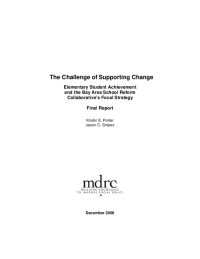The Challenge of Supporting Change
Elementary Student Achievement and the Bay Area School Reform Collaborative’s Focal Strategy
The Bay Area School Reform Collaborative (BASRC, now called Springboard Schools) in San Francisco, California, is a grant-making organization that supports districtwide efforts to improve the quality and equity of student outcomes. The organization pursues various reform strategies. This report discusses the “focal strategy,” which targeted selected “focal districts” in the Bay Area, beginning in the 2002-2003 school year, and was designed to increase the intensity of earlier BASRC reforms by creating more opportunities for district and school administrators to interact with BASRC staff. The focal strategy does not prescribe a particular curriculum or school structure. Instead, it promotes a vision of culture change, relying on three key features: coaching of district and school leaders; evidence-based decision-making at all levels of the system; and networking within and across schools to share experiences and lessons.
With funding from the William and Flora Hewlett Foundation, MDRC, a nonpartisan, nonprofit education and social policy research organization, conducted an independent evaluation of BASRC’s focal strategy. This report, the second of two, analyzes the relationship between the focal strategy and improvements in student reading achievement. It compares progress in the focal districts during the three years of the strategy’s implementation to progress in a set of carefully chosen comparison districts in the same area over the same period. Though differences in the outcomes cannot necessarily be attributed to the BASRC focal strategy, the comparison illuminates the relationships between student outcomes and the focal strategy. The key findings are:
- In the districts that participated in the focal strategy, there were improvements in reading achievement during the years of the focal strategy, but these improvements were either similar to or only slightly greater than improvements in similar districts in the Bay Area.
- The evident lack of a substantial, pervasive association between the BASRC focal strategy and student achievement may not be surprising given that the strategy primarily targeted district leadership, was not sustained at the school level, and did not specify particular instructional practices or supports at the school or classroom level.
- Overall, the implementation research suggests that, in practice, the intensity of the intervention, the consistency of focus on improving teaching and learning, and the connection between the district-level focal reforms and changes in daily school life were not sufficiently realized.
BASRC faced a variety of challenges in translating district-level coaching, evidenced-based decision-making, and networking and collaboration into changes in teaching and learning. Findings from this report indicate that the BASRC focal strategy had limited capacity to improve student performance and close achievement gaps beyond trends that were already in motion.






